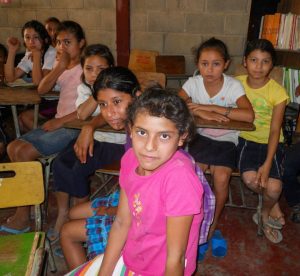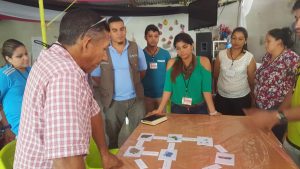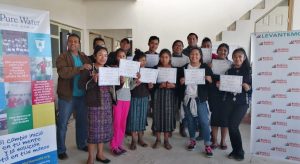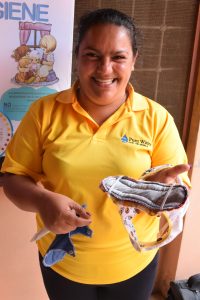The Importance of Teacher Training: A Conversation with María Inestroza, Country Director, Honduras
María, can you tell me about the teacher training programs PWW delivers and why they are important?
 We began training children at schools in 2011. Although it was fun, and we thoroughly enjoyed training the children, it was a little disappointing that we were not getting necessary participation and buy-in from the person in charge of that classroom…the teacher.
We began training children at schools in 2011. Although it was fun, and we thoroughly enjoyed training the children, it was a little disappointing that we were not getting necessary participation and buy-in from the person in charge of that classroom…the teacher.
The teachers thought of us as a one-time chat about the importance of having good hygiene…and a time for them to take a break from the children. They would leave when we arrived and return to class when we were finished. We knew this wasn’t going to create the impact we were working toward.
Safe and healthy practices with water, sanitation and hygiene are new concepts among the majority of families living in remote, underserved communities, where access to safe water and sanitation has simply not been available. So it is critical that the concepts are taught and reinforced at school and home (note: all families who participate in PWW programs also participate in WASH training programs).
 Considering the initial response to the school training program, we quickly switched directions to integrate the teachers directly into our program. We developed a training program with PWW training partner, CAWST, focused on how to effectively integrate WASH (water, sanitation and hygiene) topics into specific areas of study, such as math, Spanish and other courses that are taught daily.
Considering the initial response to the school training program, we quickly switched directions to integrate the teachers directly into our program. We developed a training program with PWW training partner, CAWST, focused on how to effectively integrate WASH (water, sanitation and hygiene) topics into specific areas of study, such as math, Spanish and other courses that are taught daily.
It sure has made a long-lasting, positive health impact that doesn’t just help the students enrolled in the school when PWW delivers the training, as the teacher continues sharing the knowledge with new students entering the school. So, in the end, all future generations will continue to gain this invaluable understanding.
From our experience, we have also found that the teacher will not only make an impact in one school or community over the years. We have found that teachers who are transferred to a different school, who have already received our training, begin making a significant positive WASH impact in their new schools and/or communities right away…without us needing to come in to train again. The knowledge passes along!
 The teacher training program is a 3-day course, which includes the following subjects:
The teacher training program is a 3-day course, which includes the following subjects:
- Routes of transmission of sickness
- Handwashing
- Water pollution and pathogens related with waterborne diseases
- Multi-barrier approach to safe water
- Sanitation systems
- Classifications and disposing of the solid waste
- Use and maintenance of latrines
- Puberty hygiene and menstrual hygiene management (see details below)
- How to integrate WASH in the annual academic plan
- Design of a plan for classes integrating WASH
 PWW has a very comprehensive training program focused on Menstrual Hygiene Management (MHM), including how to make reusable menstrual pads. The MHM training lasts for one and a half days and is taught to students, grades 4, 5 and 6 and their teacher(s). The MHM training includes:
PWW has a very comprehensive training program focused on Menstrual Hygiene Management (MHM), including how to make reusable menstrual pads. The MHM training lasts for one and a half days and is taught to students, grades 4, 5 and 6 and their teacher(s). The MHM training includes:
- Changes in Puberty
- Menstruation
- Menstrual Cycle
- Barriers and Solutions to introduce MHM into the different areas of study and lessons
- How to develop a plan for implementing MHM
PWW also provides WASH training for all parents, including MHM and puberty changes, sanitary pad production.
